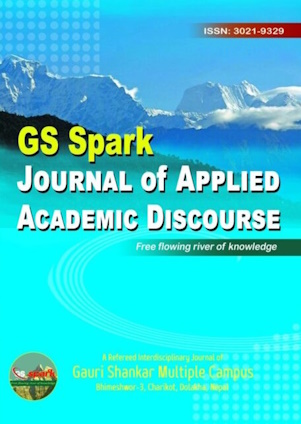Perceptions and Practices of English Language Teachers in Nepalese Schools
Research Article
GS Spark: Journal of Applied Academic Discourse, Volume 3, Issue 1, June 2025, -
Publication date: Sep 04, 2025
Views: 163 | Downloads: 0
How to cite this article
APA
In-text citation: (Phunyal, 2025)
Reference: Phunyal, B. K. (2025). Perceptions and Practices of English Language Teachers in Nepalese Schools. GS Spark: Journal of Applied Academic Discourse, 3(1), -.
Reference: Phunyal, B. K. (2025). Perceptions and Practices of English Language Teachers in Nepalese Schools. GS Spark: Journal of Applied Academic Discourse, 3(1), -.
Vancouver
In-text citation: (1), (2), (3), etc.
Reference: Phunyal BK. Perceptions and Practices of English Language Teachers in Nepalese Schools. GS Spark: Journal of Applied Academic Discourse. 2025;3(1):.
Reference: Phunyal BK. Perceptions and Practices of English Language Teachers in Nepalese Schools. GS Spark: Journal of Applied Academic Discourse. 2025;3(1):.
AMA
In-text citation: (1), (2), (3), etc.
Reference: Phunyal BK. Perceptions and Practices of English Language Teachers in Nepalese Schools. GS Spark: Journal of Applied Academic Discourse. 2025;3(1), -.
Reference: Phunyal BK. Perceptions and Practices of English Language Teachers in Nepalese Schools. GS Spark: Journal of Applied Academic Discourse. 2025;3(1), -.
Chicago
In-text citation: (Phunyal, 2025)
Reference: Phunyal, Bal Krishna. "Perceptions and Practices of English Language Teachers in Nepalese Schools". GS Spark: Journal of Applied Academic Discourse 2025 3 no. 1 (2025): -.
Reference: Phunyal, Bal Krishna. "Perceptions and Practices of English Language Teachers in Nepalese Schools". GS Spark: Journal of Applied Academic Discourse 2025 3 no. 1 (2025): -.
Harvard
In-text citation: (Phunyal, 2025)
Reference: Phunyal, B. K. (2025). Perceptions and Practices of English Language Teachers in Nepalese Schools. GS Spark: Journal of Applied Academic Discourse, 3(1), pp. -.
Reference: Phunyal, B. K. (2025). Perceptions and Practices of English Language Teachers in Nepalese Schools. GS Spark: Journal of Applied Academic Discourse, 3(1), pp. -.
MLA
In-text citation: (Phunyal, 2025)
Reference: Phunyal, Bal Krishna "Perceptions and Practices of English Language Teachers in Nepalese Schools". GS Spark: Journal of Applied Academic Discourse, vol. 3, no. 1, 2025, pp. -.
Reference: Phunyal, Bal Krishna "Perceptions and Practices of English Language Teachers in Nepalese Schools". GS Spark: Journal of Applied Academic Discourse, vol. 3, no. 1, 2025, pp. -.
ABSTRACT
This study explores the perceptions and classroom practices of English language teachers in Nepalese schools, focusing on their pedagogical approaches, use of Information and Communication Technology (ICT), and the challenges they face. Despite the critical role of English in Nepal's education and social mobility, teachers often struggle to align their positive attitudes toward modern, student-cantered methods with actual classroom practices due to systemic constraints. The research highlights a shift toward communicative and task-based teaching, yet traditional methods persist due to large class sizes, exam-driven curricula, and limited resources. ICT integration, though viewed favourably, is hindered by infrastructural issues like poor internet access and insufficient training. The study also examines the impact of Nepal's multilingual context on teaching practices and the emerging trend of reflective teaching and participatory action research. Findings underscore the need for targeted professional development, equitable resource distribution, and policy reforms to bridge the gap between teachers' aspirations and classroom realities, fostering more effective English language education in Nepal.
KEYWORDS
REFERENCES
---
LICENSE
This work is licensed under a Creative Commons Attribution-NonCommercial 4.0 International License.

